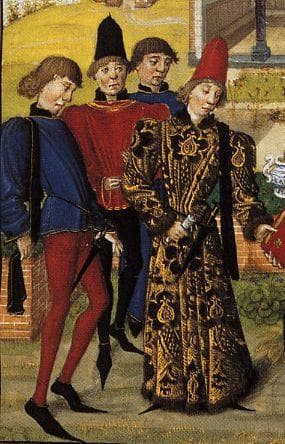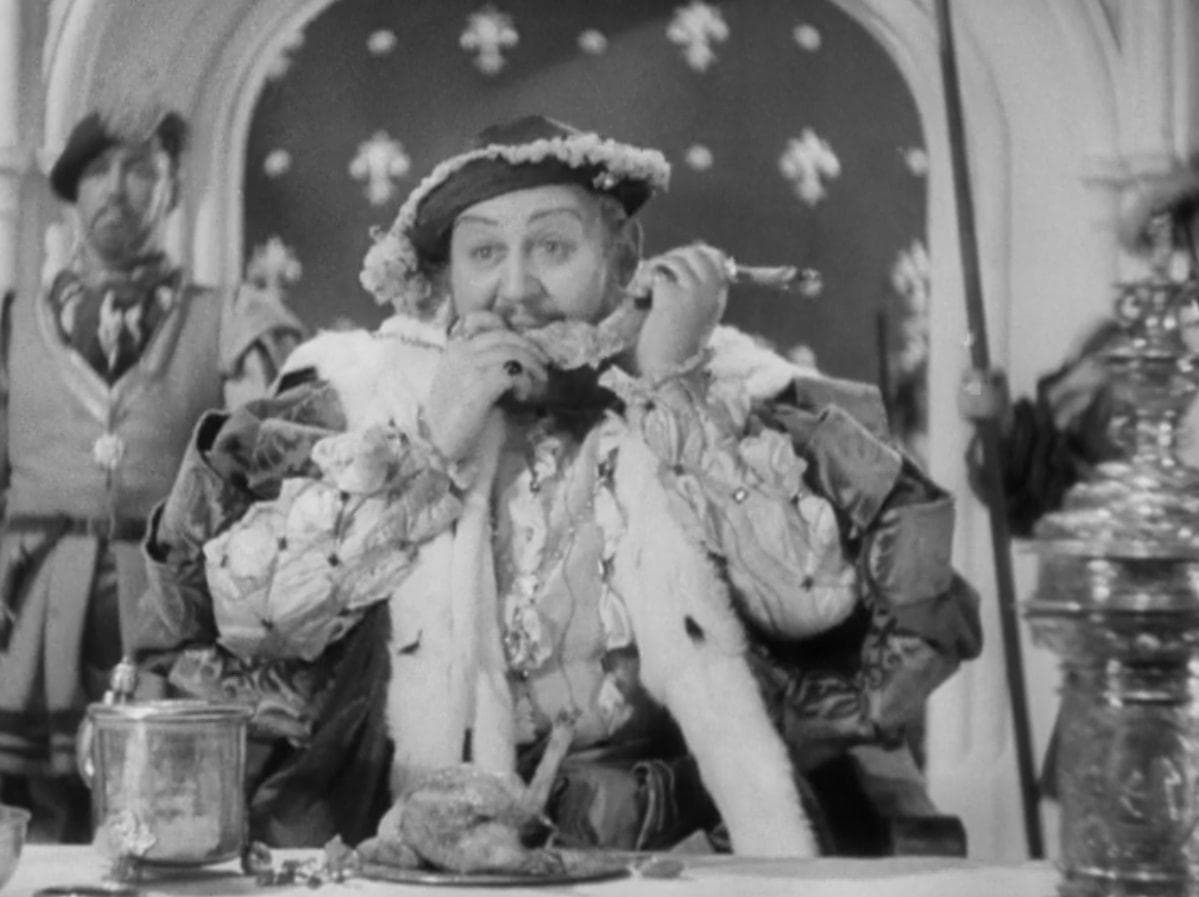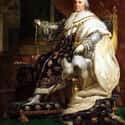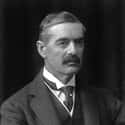-
(#4) Louis XVIII of France
- Dec. at 69 (1755-1824)
King Louis XVIII of France, the first king of the newly restored monarchy following the French Revolution, suffered from severe gout. He became King of France in 1814 and ruled for a decade, but he struggled with gout during the entirety of his tenure.
Already overweight and almost 60 years old, Louis XVIII treated his gout with herbal remedies like colchicum, which was believed to alleviate pain. By 1820, Louis XVIII's affliction was so severe that he was unable to resist his political rivals, the ultraroyalists, and essentially handed over the government to his brother Charles-Philippe, Count of Artois. The Count of Artois became King Charles X after Louis XVIII's passing in 1824.
Louis XVIII's gout was very much a result of his love of food. According to those who knew him, Louis XVIII could identify the origins of the meat he ate upon first bite. He paid the price, however, with legs that were gouty and gangrenous to the point that he allegedly lost one of his toes.
-
(#5) Napoleon III
- Dec. at 65 (1808-1873)
Napoleon III, nephew of Napoleon Bonaparte and President of France from 1848 to 1852, later seized control of the government and established himself as emperor until his death in 1873. By the mid-1850s, Napoleon III suffered from numerous health problems including bladder infections and stones, arthritis, and gout.
He was obese, experienced pain his legs, suffered from mental anguish, had odd fainting spells, and was told by doctors to rest and change his diet. Given Napoleon III's weakened condition caused by "an exhausted nervous system and diseased organs," doctors cautioned the political impact could be "fearful."
-
(#13) Anne of Denmark
- Dec. at 45 (1574-1619)
Anne of Denmark and her husband, King Charles I of England, may have both suffered from gout. On October 25, 1617, Charles was said to be nursing a sprained leg. However, it may have been a ruse to keep his subjects from knowing his true illness. Anne, for her part, was "still ill disposed, and though she would fain lay all her infirmities upon the gout, yet most of her physicians fear a further inconvenience of an ill habit or disposition through her whole body."
Clearly, both Anne and Charles were ill, but Anne's struggle with gout was more commonly known. Anne often visited Bath, England, to relieve her gout, making her an early royal adopter of 17th-century public bathing. Anne also suffered from dropsy, which became increasingly debilitating by 1618.
Charles may have had another flare-up in 1622 when he was "suddenly taken with the gout, or some such infirmity, in his knee." It's difficult to know exactly what ailed the hing, however. Observers noted:
His infirmity is given out to be the gout, and the greatest harm or sense he has of it is in the heel; and sometimes he takes pleasure to flout and play with his disease, which he says, hath changed the whole covetous course... but, in truth, the general opinion is, that he has so tender a constitution, both of body and mind, that he will hardly be able to undergo the burthen of so much business as his place requires; and that, if he do not rouse and force himself beyond his natural inclination, both private subjects and the commonwealth will suffer much.
-
(#14) Charlemagne
Charlemagne, King of the Franks and Holy Roman Emperor, united large sections of Western and Central Europe during the 8th century, all while suffering from gout. According to his biographer Einhard, Charlemagne's gout was problematic, but the emperor was at odds with his physicians after "they urged him to give up roasts, to which he was accustomed, and to eat boiled meat instead." Apparently boiled meat was something Charlemagne thought was "particularly odious."
Charlemagne didn't stop eating meat and his "daily meal was served in four courses only, exclusive of the roast, which the hunters used to bring in on spits, and which he ate with more pleasure than any other food." His health may have suffered, however, and he went lame in one foot later in life.
Charlemagne went swimming at the hot springs near his palace at Aachen to ease his gout pain. Einhard claimed Charlemagne constantly exercised "both by riding and hunting," and enjoyed "the vapour of naturally hot waters" with his sons, nobles, friends, and bodyguards. -
(#3) Benjamin Franklin
- Dec. at 84 (1706-1790)
Benjamin Franklin had a terrible case of gout, but he wasn't the only American colonial to suffer from the affliction during the 18th century. William Pitt, for example, also struggled with the disease. Franklin and Pitt were said to have discussed gout, but it's Franklin's conversation with gout, itself, that gives us insight into the nature of his affliction.
In Dialogue Between Franklin and the Gout, written in 1780, Franklin asks Gout what he did to deserve the aches and pains brought on by the disease. Gout responds that it was the result of excessive eating, drinking, and other indulgences. Gout chides Franklin for his sedentary lifestyle, asking him why he eats "an inordinate breakfast, four dishes of tea, with cream, and one or two buttered toasts, with slices of hung beef" only to "sit down to write at your desk, or converse with persons who apply to you on business... without any kind of bodily exercise."
Franklin tries to defend his use of a carriage, but Gout responds that he should burn it or offer it to "the poor peasants, who work in the vineyards and grounds about the villages... bent and perhaps crippled by weight of years, and too long and too great labor."
In the end, Gout and Franklin agree that physicians, or "quacks," are not the answer and Franklin promises to "take exercise daily, and live temperately." Gout tells Franklin it's only a matter of time before he picks up his "old habits," cautioning Franklin about a return visit "at a proper time and place."
-
(#12) Neville Chamberlain
- Dec. at 71 (1869-1940)
Serving as British Prime Minister from 1937 to 1940, Neville Chamberlain didn't want everyone to know he had gout, indicating he "would like to keep the gout out of the press... if only to avoid all the letters of sympathy and the offers of gifts of remedies that it always bring forth."
Chamberlain's gout had been a problem for years, flaring up several times in 1932. While at the Lausanne Conference in June 1932, he wrote to his sister Hilda that he "got this accursed gout again" and had "been lying on a sofa ever since."
Chamberlain had to use a gout boot, crutches, and medication to alleviate his pain, asserting that "life seem[ed] insupportable at times." At first, Chamberlain took the advice of his doctors and avoided meat to quell flares; however, after denying himself meat for two months and still suffering, he decided against consulting with physicians again.
It's unreasonable to think Chamberlain's gout influenced his interactions with Hitler during the late 1930s, but it's possible the illness shaped the trajectory of Chamberlain's career. When he was asked to take a seat on the board of Lloyds Bank during the 1910s, he reportedly turned it down because his gout was so severe.
New Random Displays Display All By Ranking
About This Tool
Gout is a disease with a long history, once called "the disease of kings". Many historical figures have suffered from gout, and some have even been tortured to death, including many emperors and celebrities, such as Alexander the Great, Frederick the Great, Goethe, Leonardo da Vinci. In France in the first half of the 13th century, more than a dozen kings, such as Louis VII and Louis XVI, suffered from gout.
In the past, privileged people had more opportunities to enjoy food and excessive drinking, so they were more likely to get gout than ordinary people. The incidence of gout is closely related to diet and lifestyle. The random tool lists 14 famous historical leaders who suffered gout for a long time.
Our data comes from Ranker, If you want to participate in the ranking of items displayed on this page, please click here.















